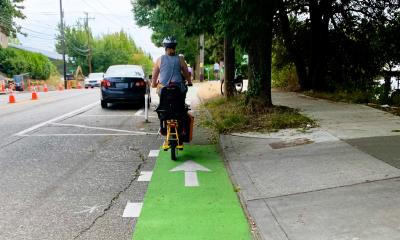Cascade has joined Seattle Mayor Bruce Harrell, City Council members, and active transportation allies in the Keep Seattle Moving campaign to win voter support for Proposition 1 on the November ballot.
Join the effort to pass Proposition 1 and help us secure $133.5 million for essential bike infrastructure improvements. Volunteer today to spread the word about Keep Seattle Moving and make a real impact on our city’s future!
“Voters face a lot of big issues on the November ballot, and we want to make sure that everyone who supports better biking, rolling, and walking in Seattle votes YES for Prop 1 to Keep Seattle Moving,” says Tyler Vasquez, Cascade’s Seattle policy manager.
“Seattle’s bike network is only as safe as its weakest link,” Vasquez says. “There are too many gaps and weak links in our bike network that prevent people from bicycling. Keep Seattle Moving would fill many of those gaps, especially in South Seattle.”
Keep Seattle Moving is the new name for the Seattle Transportation Levy, which has funded many of the protected bike lanes we benefit from today. However, the current levy expires at the end of 2024. Failing to pass Proposition 1 to renew the levy for another eight years would bring progress to a standstill.
Learn more in our previous post, “Top Five Wins for Safer Bicycling in the Seattle Transportation Levy.”

Keep Seattle Moving Policy Ride
To understand the importance of Seattle Transportation Levy dollars, Vasquez recently led a policy ride from the downtown waterfront to Columbia City. We started at the western end of Yesler Way, where the city is designing a two-way protected bike lane to fill a two-block gap in the bike network.
Once completed, the Yesler Way Protected Bike Lane will allow people biking on the 4th Avenue and 2nd Avenue bike lanes to safely reach the ferry terminals and the Elliot Bay bike path along the Alaskan Way waterfront. Funding for this project is an example of what we lose if we let the Seattle Transportation Levy expire.

“This is an example of how filling a short gap in the bike network can transform the experience for people biking,” Vasquez says.

Our next stop was the new protected bike lanes on MLK Jr. Way, which turned a dangerous 1.5-mile stretch of high-traffic roadway into a safe and protected corridor for people walking and biking from Judkins Park to the Mount Baker Link light rail station.

Watch Cascade Board Member Hanoch Yeung’s video of the MLK Jr. Way Safety Project.
We boarded the Link light rail train at Mount Baker Station and disembarked one stop later at the Beacon Hill station.

Beacon Hill is the site of another big project funded by Seattle Transportation Levy dollars: the long-awaited Beacon Avenue South and 15th Avenue South Safety Project.
This project includes new protected bike lanes on both sides of 15th Avenue South and Beacon Avenue South, as well as new bike signals, sidewalk improvements, and bus stop islands. As one of the most dangerous corridors in Seattle, these improvements to biking in Beacon Hill have been needed for decades.
The next leg of our policy ride took us down Beacon Avenue South, which has no bike lanes. Google Maps designates this route as bike-friendly, but in its current state, it is far from “bike friendly” due to high-speed car traffic, making it a road best avoided by people biking.
Good news: Keep Seattle Moving will transform this section of Beacon Avenue South if approved by voters. Keep Seattle Moving includes money to create an approximately seven-mile protected bike lane from Capitol Hill to South Beacon Hill.
Turning off Beacon Avenue South onto South Columbian Way, we got a glimpse of the Even Better Bike Lanes project underway by the Seattle Department of Transportation. This Levy-funded program improves separation between people biking and driving by updating flexible plastic posts to concrete barriers.

Prop 1 includes money to update approximately 30 percent of flexible plastic posts and painted lines with concrete barriers by 2032.
Learn more about Keep Seattle Moving and volunteer to build support for Prop 1 by talking to your neighbors, tabling at community events, and continuing the progress to make Seattle the most bike-friendly city in the nation.
Share this post

